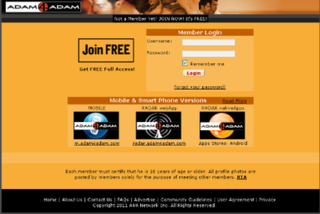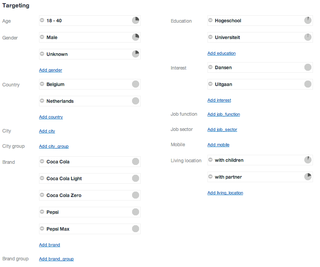
Neopets is a free-to-play virtual pet website. First launched in 1999, the website allows users to own virtual pets ("Neopets") and explore a virtual world called "Neopia." Players can earn one of two virtual currencies. One currency, called Neopoints, can be obtained for free through on-site features like games, events, and contests. The other, Neocash (NC), is purchased with real-world money and can be exchanged for wearable items for pets.

Xanga was a website that hosted weblogs, photoblogs, and social networking profiles. It was operated by Xanga.com, Inc. and based in New York City.

Jdate is an online dating service aimed at Jewish singles. The service is one of a number of demographically focused online match-making websites operated by Spark Networks, Inc.

Myspace is a social networking service based in the United States. Launched on August 1, 2003, it was the first social network to reach a global audience and had a significant influence on technology, pop culture and music. It also played a critical role in the early growth of companies like YouTube and created a developer platform that launched the successes of Zynga, RockYou and Photobucket, among others. From 2005 to 2009, Myspace was the largest social networking site in the world.
Gaydar is a profile-based dating website for gay and bisexual men.
Online advertising, also known as online marketing, Internet advertising, digital advertising or web advertising, is a form of marketing and advertising that uses the Internet to promote products and services to audiences and platform users. Online advertising includes email marketing, search engine marketing (SEM), social media marketing, many types of display advertising, and mobile advertising. Advertisements are increasingly being delivered via automated software systems operating across multiple websites, media services and platforms, known as programmatic advertising.

A social networking service (SNS), or social networking site, is a type of online social media platform which people use to build social networks or social relationships with other people who share similar personal or career content, interests, activities, backgrounds or real-life connections.

Meebo was an instant messaging and social networking service provider. It was founded in September 2005 by Sandy Jen, Seth Sternberg, and Elaine Wherry, and was based in Mountain View, California. Initially the company offered a web-based instant messenger service, extending its offer in more general online chat and even social networking directions. In June 2012, Google acquired Meebo to merge the company's staff with the Google+ developers team.
BlackPlanet is an African-American social networking service for matchmaking and job postings. The company website also contains forums for discussion of political and social issues.
MiGente.com was an online social-networking site specifically targeting the Hispanic community. It was launched in 2000. Its former parent company, Community Connect Inc., claimed that MiGente.com was the fastest growing English language site for the Hispanic community with over 3 million registered members. Members come from a variety of Hispanic backgrounds.

Adam4Adam is an online dating website designed for men to meet other men "for friendship, romance, or a hot hookup".

Gay.com was a chat, personals, and social networking website catering to the LGBT community. The site was a digital brand of Here Media Inc. In addition to community features, the site featured LGBT-related news and features. As of September 2005, San Jose Mercury News ranked gay.com as the most popular online gay personals site in the United States. As of March 2007, Hitwise ranked it number three in domestic American popularity after Adam4Adam and Manhunt. Gay.com also used to compete internationally with dudesnude, gayromeo, and gaydar.
AsianAve or Asian Avenue was a social networking service that focused on Asian Americans. The platform was shut down and the URL now redirects to its sister site, BlackPlanet.

Tagged is a social discovery website based in San Francisco, California, founded in 2004. It allows members to browse the profiles of any other members, and share tags and virtual gifts. Tagged claims it has 300 million members as of 2014. As of September 2011, Quantcast estimates Tagged monthly unique users at 5.9 million in the United States, and 18.6 million globally. Michael Arrington wrote in April 2011 that Tagged is most notable for the ability to grow profitably during the era of Facebook.
Website monetization is the process of converting existing traffic being sent to a particular website into revenue. The most popular ways of monetizing a website are by implementing pay per click (PPC) and cost per impression (CPI/CPM) advertising. Various ad networks facilitate a webmaster in placing advertisements on pages of the website to benefit from the traffic the site is experiencing.

Targeted advertising is a form of advertising, including online advertising, that is directed towards an audience with certain traits, based on the product or person the advertiser is promoting.
Social network advertising, also known as social media targeting, is a group of terms used to describe forms of online advertising and digital marketing that focus on social networking services. A significant aspect of this type of advertising is that advertisers can take advantage of users' demographic information, psychographics, and other data points to target their ads.

Social media marketing is the use of social media platforms and websites to promote a product or service. Although the terms e-marketing and digital marketing are still dominant in academia, social media marketing is becoming more popular for both practitioners and researchers.

A brand page, in online social networking parlance, is a profile on a social networking website which is considered distinct from an actual user profile in that it is created and managed by at least one other registered user as a representation of a non-personal online identity. This feature is most used to represent the brands of organizations associated with, properties owned by, or general interests favored by a user of the hosting network.

Scruff is an international social application for men seeking men that runs on iOS and Android devices. The app allows users to upload profiles and photos, and search for other members by location and shared interests. Users can directly message other users or they can use the app's "Woof" feature, which allows users to express interest in another user's profile.













